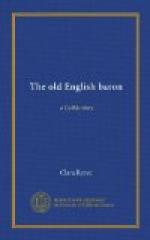At the hour of dinner the young men presented themselves before their Lord, and his guest. Sir Philip addressed himself to Edmund; he asked him many questions, and received modest and intelligent answers, and he grew every minute more pleased with him. After dinner the youths withdrew with their tutor to pursue their studies. Sir Philip sat for some time wrapt up in meditation. After some minutes, the Baron asked him, “If he might not be favoured with the fruits of his contemplations?”
“You shall, my Lord,” answered he, “for you have a right to them. I was thinking, that when many blessings are lost, we should cherish those that remain, and even endeavour to replace the others. My Lord, I have taken a strong liking to that youth whom you call Edmund Twyford; I have neither children nor relations to claim my fortune, nor share my affections; your Lordship has many demands upon your generosity: I can provide for this promising youth without doing injustice to any one; will you give him to me?”
“He is a fortunate boy,” said the Baron, “to gain your favour so soon.”
“My Lord,” said the knight, “I will confess to you, that the first thing that touched my heart in his favour, is a strong resemblance he bears to a certain dear friend I once had, and his manner resembles him as much as his person; his qualities deserve that he should be placed in a higher rank; I will adopt him for my son, and introduce him into the world as my relation, if you will resign him to me; What say you?”
“Sir,” said the Baron, “you have made a noble offer, and I am too much the young man’s friend to be a hindrance to his preferment. It is true that I intended to provide for him in my own family; but I cannot do it so effectually as by giving him to you, whose generous affection being unlimited by other ties, may in time prefer him to a higher station as he shall deserve it. I have only one condition to make; that the lad shall have his option; for I would not oblige him to leave my service against his inclination.”
“You say well,” replied Sir Philip; “nor would I take him upon other terms.”
“Agreed then,” said the Baron; “let us send for Edmund hither.”
A servant was sent to fetch him; he came immediately, and his Lord thus bespoke him.”
“Edmund, you owe eternal obligations to this gentleman, who, perceiving in you a certain resemblance to a friend of his, and liking your behaviour, has taken a great affection for you, insomuch that he desires to receive you into his family: I cannot better provide for you than by disposing of you to him; and, if you have no objection, you shall return home with him when he goes from hence.”
The countenance of Edmund underwent many alterations during this proposal of his Lord; it expressed tenderness, gratitude, and sorrow, but the last was predominant; he bowed respectfully to the Baron and Sir Philip, and, after some hesitation, spoke as follows:—




